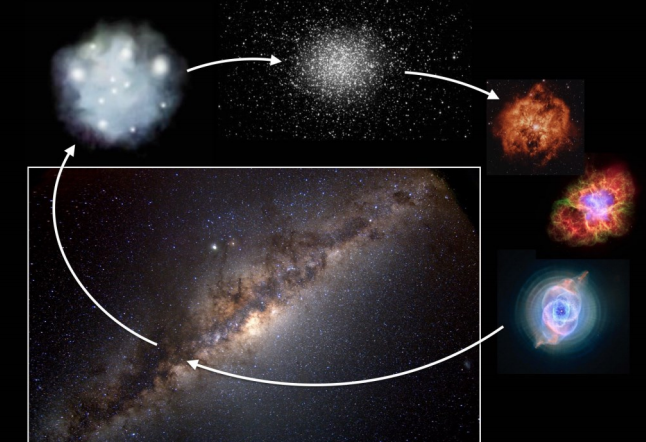Data
Uncertainties in Galactic Chemical Evolution Models

Galactic chemical evolution is a field that aims to understand the formation and evolution of the elements from the early Universe to present time. Reproducing the evolution of the elements inside a galaxy with numerical models requires different areas of expertise and offers the possibility to connect various fields of research such as nuclear physics, stellar evolution, observation, galaxy evolution, and cosmology. But each field has uncertainties that can affect the reliability of numerical predictions when compared with the chemical signatures observed in stars. To this day, it is still difficult to define the real amount of uncertainties inherent in chemical evolution models.
This study [1] is a first step in JINA’s effort to establish a numerical pipeline that connects nuclear astrophysics research with galactic chemical evolution. We compiled several observational studies to constrain the value and uncertainty of fundamental input parameters, including the stellar initial mass function (the number of stars with a certain mass that form in stellar clusters) and the rate of supernova explosions. We ran hundreds of simulations, using a Monte Carlo approach, to quantify how the uncertainties in these parameters propagate and affect our numerical predictions.
Figure 2 shows the resulting uncertainty in the evolution of the carbon-to-iron ratio as a function of the iron-to-hydrogen ratio (a proxy for galactic age) for a galaxy with properties similar to the Milky Way. The level of uncertainty, which are lower limits, depends on the galactic age and on the targeted elemental ratio (see [1] for more elements). For this work, we used NuGrid stellar models [2] and the SYGMA [3] and OMEGA [4] codes, which are available online [5] and part of the JINA-CEE chemical evolution pipeline.
Researchers: B. Côté (JINA-CEE, UVic & MSU), C. Ritter (JINA-CEE & UVic), B. W. O’Shea (JINA-CEE & MSU), F. Herwig, (JINA-CEE & UVic) M. Pignatari (JINA-CEE & U. of Hull), S. Jones (HITS), C. L. Fryer (JINA-CEE & LANL)
